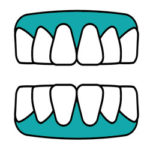- Commonly referred to as false teeth, dentures are removable prostheses which are used to replace missing teeth.
- Typically made up of acrylic or a combination of acrylic and metal, partial dentures can be fitted to replace some missing teeth while a complete denture is used when all your natural teeth are missing.
- As well as improving your appearance and confidence, dentures enable you to speak, eat and function much more easily and effectively.

